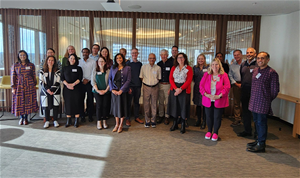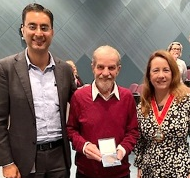
Before getting into updates from PCHD, I need to say a few words about recent news coming out of the RACP Board. The last few weeks have been unsettling and, for some, distressing, but I want to reassure you that the essential business of the College, such as training, ongoing education, policy and advocacy work has been continuing and will continue even as Board matters change and progress. Please be assured that the committee members and staff responsible for these vital functions remain committed and active, and that the College’s work continues uninterrupted, regardless of activity at Board level. I want to thank all those who are continuing to support the College in any capacity, and I join you all in hoping for an amicable resolution soon.
The PCHD Council met face-to-face in Sydney over two days in late July. Day one was a business-as-usual meeting, including preliminary discussions of a new work plan for Council for the next year. Day two saw us joined by representatives from PCHD Advanced Training Committees (ATCs) and RACP-affiliated paediatric specialty societies. This is an annual event and is always a great opportunity to not only share challenges and priorities, but to get together in-person to network with others dedicated to paediatric, adolescent, and young adult health care. Shared topics of interest included education matters such as curriculum review/renewal and accreditation, as well as policy and advocacy topics discussed in more detail below. We will be providing all attendees with a summary of the day and keeping an eye on progress ahead of our next annual catch-up in 2026.

I would like to acknowledge and thank the members of PCHD Council and the representatives of ATCs and specialty societies for their commitment and sacrifice that they make to serve on College bodies. Our discussion made it clear that we all share the same priority: supporting the needs of children and young people, and the systems where we train and practise as paediatricians. I look forward to continuing our work together on the important items we discussed.
The PCHD membership, in partnership with the RACP Policy and Advocacy team, has been incredibly busy recently with several key activities. This has included the publication of the Supporting Children and Young People’s Health and Wellbeing in Conflict Zones statement. This is a significant statement that reaffirms the commitment of the PCHD to advocating – now and into the future – for the rights, dignity, health and wellbeing of all children and young people impacted by conflict.
At the end of August, the RACP hosted a virtual ADHD Roundtable event with representatives from medical colleges, specialty societies and other key stakeholder organisations across Australia. Dr Hotton and I attended as PCHD President-elect and President – see the linked event summary above for names of other attendees. Discussions covered the current landscape and jurisdiction proposals, key issues, models of safe shared care, advocacy needs/opportunities and government supports. The RACP continues to engage with the Commonwealth and, state and territory governments, the Royal Australian College of General Practitioners (RACGP) and the Royal Australia and New Zealand College of Psychiatrists (RANZCP) to enable a nationally consistent approach to ADHD management. Special thank you to Professor Nitin Kapur for being Facilitator for the Roundtable. The RACP also released a media statement on the day of the Health Ministers’ Meeting, where they spoke about ADHD.
Also in August, the Hon Mark Butler MP, Minister for Health, Disability and Ageing, and the National Disability Insurance Scheme (NDIS), announced reforms to establish a national system of support for parents and children outside the NDIS. The Thriving Kids initiative will commence from 1 July 2026 and focus on identifying developmental concerns earlier for children aged eight-years-old and under with mild to moderate developmental delay and autism. The RACP, with the Australasian Society for Developmental Paediatrics (ASDP) and Academy of Child and Adolescent Health, wrote to the Minister regarding our vital involvement. We are also liaising with the Minister’s Office and Professor Frank Oberklaid AM, who has been appointed to co-chair the work. An Inquiry into the Thriving Kids initiative was recently announced, with the Committee led by paediatrician Dr Mike Freelander MP (Chair) and paediatric neurologist Dr Monique Ryan MP (Deputy Chair). The RACP will be providing a submission to the Inquiry.
Following conversations with PCHD members over the past 12 months, and particularly with the PCHD Policy and Advocacy Committee (PPAC) and PCHD Council members, a focus on paediatric MBS items and opportunities has been agreed to be led through PPAC. PPAC, working with the ASDP, will create an advocacy ‘business case’ to drive ongoing meetings with the Department of Health, Disability and Ageing and the Minister for Health.
The PCHD leadership – comprising myself as President, Dr Paul Hotton (President-elect and Chair of the Chapter of Community Child Health Committee), and Professor Simon Denny (immediate past Chair of the Adolescent and Young Adult Medicine Committee) – recently met with Professor Ruth Vine and several panel members conducting the independent review of evidence on Stage 1 (puberty suppression) and Stage 2 (gender-affirming) hormone therapies in paediatric gender services within Queensland Health facilities. Together with colleagues from sexual health medicine, endocrinology and clinical pharmacology, members shared experiences, opinions and advice with the panel. Recommendations from the panel to the Queensland Government is expected by 30 November 2025.
The new policy document, Social Media: Children and Young People, is receiving final adjustments before publication. It provides key recommendations to governments in Australia and Aotearoa New Zealand, as well as to social media platforms, to support stronger measures for keeping children safe online. In parallel, important policy work continues on immunisation and developmental assessments.
Recent media interviews for paediatrics have included matters related to Thriving Kids, ADHD, melatonin use with children, and a recent UNICEF global nutrition report and childhood obesity rates. You can read recent media releases and about the RACP in the media via the RACP website.
Today, a statement regarding Paracetamol use in pregnancy has been published on the RACP website noting our concern with the recent announcement from the United States suggesting a causal link between acetaminophen use in pregnancy and autism spectrum disorder in children.
I’d like to give a little highlight to the Child Protection Paediatric Society of Australasia (CPPSA) – a relatively new paediatric specialty society – who will hold their annual conference in Melbourne on 27 and 28 November 2025. Topics will include: alternative therapies and diets, proposed changes to the age of criminal responsibility, expert witnesses in an increasingly adversarial justice system, and more. They welcome associate, trainee and ordinary members as well as non-member health workers to contribute to the discussions and networking activities. Link here for more information.
In closing, it’s my privilege to honour the life of the late Professor David Isaacs. With far too many achievements to outline here (as shown by the recent RACP President’s Message), I can only touch on a few career highlights.
David was in his son Mark’s words “a gentle and warm-hearted man” who was also a fierce and unswerving champion for those unable to advocate for themselves, as demonstrated by his case study contribution to the RACP submission to the 2016 Senate inquiry into the conditions and treatment of asylum seekers on Nauru and Papua New Guinea. In 2017, the RACP celebrated a number of members who were known for their support of refugee and asylum-seeker health. Of course, David was among those profiled.
His efforts continued into 2019 where he fought to save the government’s Medevac legislation, stating “Every person should have access to necessary and appropriate medical care and, as clinicians, we have a duty to uphold this basic human right.”
A panel discussion on Ethical Dilemmas held at the RACP Congress 2018 has been saved as a Pomegranate Podcast (episode 37) and gives an opportunity to hear David speaking with the passion, wisdom and humour for which he was known. He was also a well-known man of letters, serving as Editor-in-Chief of the Journal of Paediatrics and Child Health (JPCH) for over ten years, as well as being a celebrated author in his own right. He also established the HARK clinic at Westmead Children’s Hospital to provide assessments for newly arrived refugee children and families.
PCHD honoured David with the Howard Williams Medal in July 2023 as recognition for his many contributions to our specialty. He was an extraordinary advocate for children’s health and wellbeing, and he will be greatly missed.

Dr Niroshini Kennedy
PCHD President
Pomegranate Health podcast: Your contributions welcome
The RACP podcast, Pomegranate Health, has published over 100 episodes since starting out ten years ago.
To provide more frequent and focused content we’re seeking contributions from our speciality societies, committees and affiliated professional organisations.
You already spend considerable time preparing lectures and webinars for your colleagues. Audio podcasts provide an easy way to reach thousands more around the world.
Each episode gets downloaded around 6500 times over the first 12 months from publication, with 21 per cent of listeners located outside of Australia and Aotearoa New Zealand.
All you need to do is to organise one or more presenters and an interviewer familiar with the material. The podcast producer will coordinate an online recording lasting about one hour and then edit it down before publication. The intention would be to ‘brand’ regular episodes from your specialty society or organisation.
Please send any questions or ideas to podcast@racp.edu.au